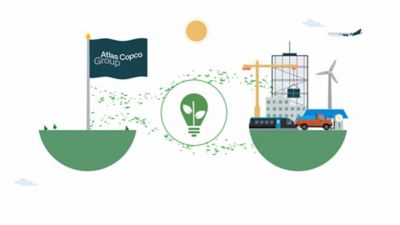
Why train beats the plane
July 8, 2021
A pilot project for rail freight between Atlas Copco’s industrial vacuum production facility in Germany and its counterpart in China shows that rail transport can balance costs, speed and sustainability better than air and ocean freight.
Atlas Copco’s commitment to growing in the right way underpins the green logistics strategy of the Group’s Industrial Vacuum division. But there’s always a challenge to balance fast deliveries, transportation costs and minimal environmental impact.
Leybold, a leading vacuum producer based in Cologne, Germany, sends heavy pumps weighing more than 150 kilograms, plus semi-finished parts such as components and rotors, to Tianjin, China, for local production and distribution. Although air cargo transports are quickest, at 10 days or less, the growing volumes to the Far East meant planes had become unsustainable, as Alexander Irchin, Logistics Manager, Atlas Copco Vacuum Technique, explains.
“We wanted to move away from using air freight as rail transportation is more economical. We were also concerned about the high levels of CO2 emissions produced through air transportation.”
Finding a new way
China’s heavy investment in the Belt and Road infrastructure project across Asia, and in the German port of Duisburg, has been a game changer for rail travel between China and Europe. Leybold therefore decided to make a rail freight pilot.
The "Lighthouse project" began in mid-2019, when 20 full container loads were sent by rail nearly 8 000 kilometers from Germany to China. In 2020, Leybold sent 74 containers of Rail cargo to Shanghai and Tianjin. The flow is arranged so that the full container load first goes to the production facility, where the team unloads the relevant goods before dispatching a truck onward to the customer center.
The benefits of train transports are clear. On this particular route, rail freight is 75% less costly than air freight, while the train's carbon emissions are 90% lower. Compared to ocean freight, the train is 50% quicker as the distance by rail is 8 000 kilometers compared to more than 23 000 kilometers by ocean.
Rail freight between Atlas Copco's industrial vacuum production facility in Germany and its counterpart in China.
Securing the load
During the pilot, all Leybold’s transports were put in ocean freight packaging to avoid corrosion, while reducing the amount of plywood and completely eliminating the need for polyurethane foam. The transports were monitored via GPS tracker and the cargo’s temperature, humidity and load shocks were measured.
There can be significant temperature and humidity fluctuations, and load vibrations, but no significant damage was reported. This data prompted a decision to switch to rail for all but the heaviest of cargoes, which still go by container ship.
When distances are long, the planning time is important to ensure local market expectations can be met. Supply chain strategies focusing on planning delivery times, covering manufacturing and transport, are key to managing the right level of inventory for local markets and ‘just in time’ refilling.
Another Europe to China rail pilot is now underway in Edwards, also part of the Atlas Copco Vacuum Technique. Its distribution centre in Czech Slavonin has started to ship products to destinations in Shanghai and Qingdao, via Poland. "We have also establishes rail shipments from China to European customers from our manufacturing center in Qingdao," Alexander says. "In addition to saving time and money, this also brings a reduction in CO2 emissions and on top of that improves customer satisfaction."
“Our strategy to switch to rail is driven by environmental and cost optimization needs, but it is also based on a strong focus on customer requirements. We wanted to establish a method that would get products to them without undue delay. It also proved to be a wise choice from a flexibility point of view. When we initiated this project we had no idea a global pandemic would hit, with logistics constraints and restrictions to follow. By using alternative and reliable transport modes like rail we have been able to maintain supply and customer support also in this challenging time,” Alexander Irchin concludes.
Awarded the Giuilio Mazzalupi Award in 2021
The Giulio Mazzalupi Operational Excellence Award is one of the Group's internal awards that is handed out on an annual basis. It aims to reward a person or a team for significant contributions of improving and executing processes aimed at delivering products or services to customers in the most satisfying, sustainable, cost-effective, and timely manner. The winners in 2021 were Alexander Irchin, Logistics Manager in Industrial Vacuum Division and Oezkan Dimir, Project Assistant Global Logistics in Leybold, who were awarded for their initiative of moving away from air freight into a new mode of transportation.
Related stories



The best of both worlds
As an industrial PhD student you are often alone, with one foot in academia and one foot in business. Bridging these worlds can be quite a challenge. Atlas Copco’s research school network provides a support network where students can exchange experiences and grow while pursuing their academic ambitions.




